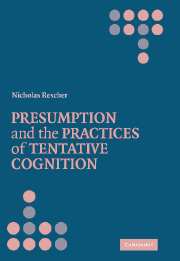Book contents
- Frontmatter
- Contents
- Preface
- Presumption and the Practices of Tentative Cognition
- 1 The Legal Roots Of Presumption
- 2 Presumption and Burden of Proof
- 3 Cognitive Presumption and Truth
- 4 Validating Cognitive Presumptions
- 5 Presumption and Inquiry
- 6 Default Reasoning
- 7 Presumption and Trust
- 8 Presumption and Communication
- 9 Presumption in Science and Beyond
- 10 Specificity Prioritization and the Primacy of the Particular
- 11 Dismissing Extremely Remote Possibilities
- Conclusion
- Bibliography
- Index of Names
Preface
Published online by Cambridge University Press: 24 July 2009
- Frontmatter
- Contents
- Preface
- Presumption and the Practices of Tentative Cognition
- 1 The Legal Roots Of Presumption
- 2 Presumption and Burden of Proof
- 3 Cognitive Presumption and Truth
- 4 Validating Cognitive Presumptions
- 5 Presumption and Inquiry
- 6 Default Reasoning
- 7 Presumption and Trust
- 8 Presumption and Communication
- 9 Presumption in Science and Beyond
- 10 Specificity Prioritization and the Primacy of the Particular
- 11 Dismissing Extremely Remote Possibilities
- Conclusion
- Bibliography
- Index of Names
Summary
“Dr. Livingston, I presume” runs the famous exclamation with which H. M. Stanley greeted the long-lost explorer. And in saying this he as much as said that “this is what I am going to take to be the case unless and until further developments should show that it is not.” That is just exactly how presumption works.
The topic of presumption encompasses a wide range of practices within our quest for informative knowledge and practical decision. These particular resolutions, however, have a tentative quality in being taken to hold not with categorical assurance but rather provisionally and pro tem until such a point when (if ever) sufficiently strong counterindications come to light. Such presumptions carry a burden of proof that inclines upon anyone who is disinclined to accept them.
The practice of presumption arose initially in the law but subsequently became operative in virtually every area of rational endeavor, for presumption is a remarkably versatile and pervasively useful resource. Firmly grounded in the law of evidence from its origins in classical antiquity, it made its way in the days of medieval scholasticism into the theory and practice of disputation and debate. And it subsequently extended its reach to play an increasingly significant role in the philosophical theory of knowledge. It has thus come to represent a region where lawyers, debaters, and philosophers can all find some common ground.
- Type
- Chapter
- Information
- Presumption and the Practices of Tentative Cognition , pp. xi - xivPublisher: Cambridge University PressPrint publication year: 2006



